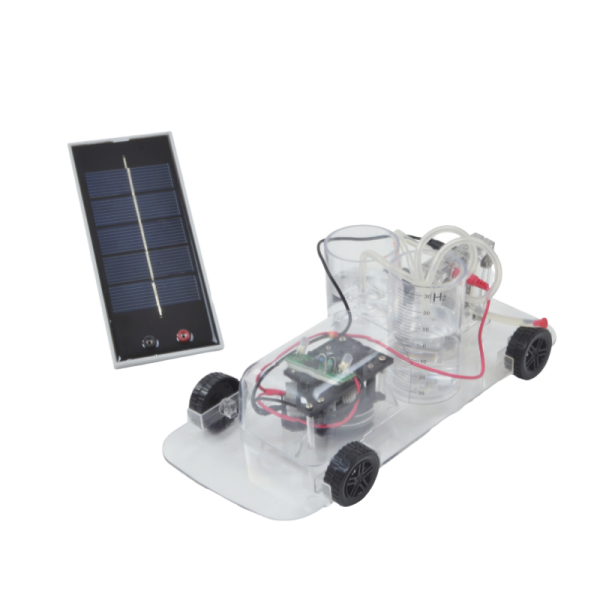Fuel Cell Car Science Kit
Horizon’s Fuel Cell Car Science Kit is one of the best tools for teaching the principles behind the real-scale fuel cell vehicles currently being rolled out across the world.



Fuel Cell Car Science Kit - product overview
Horizon’s Fuel Cell Car Science Kit enables students to discover the principles behind the real-scale fuel cell vehicles currently being rolled out across the world. Power an electrical circuit by solar panel or a wind turbine with profiled blades based on NASA aeronautics. Generate hydrogen through water electrolysis and convert it into electricity using a PEM fuel cell. Whichever combination of technologies you want to explore, this science kit is a comprehensive introduction to the principles behind renewable microgrids.
- Investigate reaction yields, reduction and oxidation, and other chemistry concepts by performing electrolysis reactions.
- Learn about conservation of energy, electric power, and other physics concepts by modifying your fuel cell car.
Hydrogen: Fuel of the Future
Hydrogen offers the promise of a sustainable energy source for the future of transportation, and the potential to greatly reduce CO2 emissions. Hydrogen is the most commonly occurring element in the universe. It is a colorless, odorless, non-poisonous gas that is lighter than air. Hydrogen is one of the most important alternative fuels for the future, because it has the ability to replace all the fossil fuels used on the road today, and thus to reduce greenhouse gas emissions. The governments of countries around the world see the promise of hydrogen and are investing billions of dollars in research and development for hydrogen energy technologies. The U.S. Department of Energy has a Hydrogen Program that is working with industry, schools, laboratories, and other government agencies to overcome the obstacles standing in the way of widespread fuel cell adoption. They are addressing issues in hydrogen production, delivery, storage, safety, and fuel cell technology itself. According to HyWays, a research project funded by the European Union, building a hydrogen infrastructure in Europe would allow for a reduction in CO2 emissions from automobile transportation of over 50 percent by 2050, and it could be done in an economically acceptable manner. A critical hurdle for the use of this innovative fuel that must be overcome is the distribution of hydrogen to individual automobiles. A large network of hydrogen fueling stations would need to be installed, just like our current network of gasoline fueling stations. This is only economically viable and feasible as a large-scale effort. Strong joint efforts from all of the stakeholders in both the public and private sectors is crucial to the successful adoption of hydrogen technology.

Included Components:
- Chassis and wheel set
- Built-in motor
- H2 storage tank
- O2 storage tank
- PEM fuel cell
- Tubing & Cables
- Solar Panel

Curriculum
What is included in the horizon energy curriculum? The lab equipment is just the beginning. We’ve built the horizon energy curriculum to provide teachers with multiple resources for engaging their students.
Materials provided
- Hands-on Lab Activities
- Teacher's Guides
- Student's Guides
Concepts covered

Chemistry Concepts
Electrolysis, Energy, Hydrogen Generation, Reaction Rates, Reactions, Redox Reactions

Physics Concepts
Classical Mechanics, Efficiency, Energy, Ohm's Law, Power (Electric)

Earth Science Concepts
Renewable Energy







